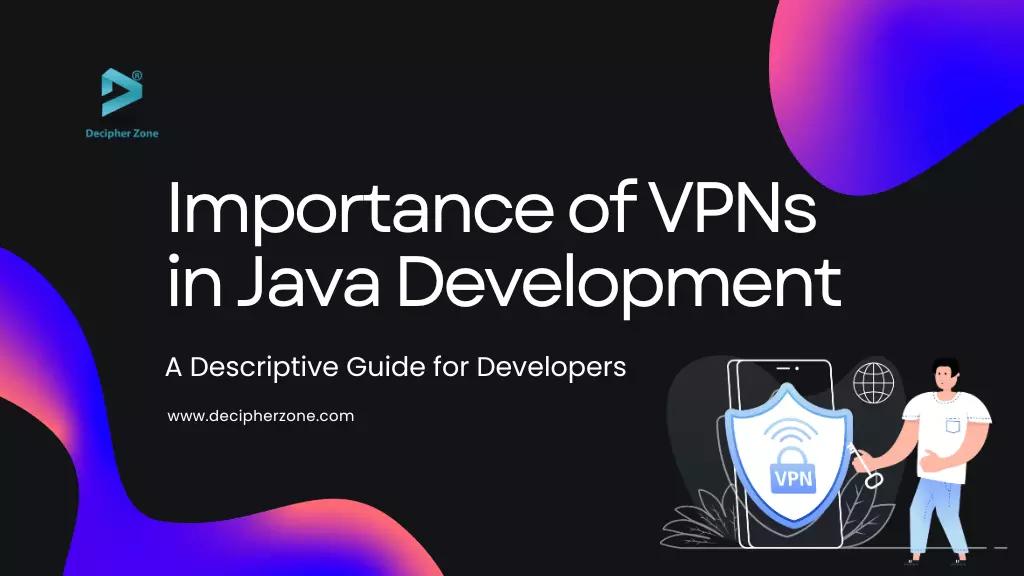Today, in a digitalized world where data breaches and cyber-attacks are rampantly increasing, no other reason has become more imperative than this to solicit that sensitive information be guarded with extraordinary precautions. This becomes more valid for Java developers who work with a lot of proprietary code and very sensitive data. Such data should be protected through a strong cybersecurity strategy, and one important component is the usage of a Virtual Private Network (VPN). One popular option is Urban-VPN, known for offering secure and private internet connections without compromising on speed or usability. This article looks at the importance of using VPNs in Java development and why developers and companies cannot afford to miss them.
What is a VPN and how can it be that important?
A Virtual Private Network (VPN) is a technology that creates a secure, encrypted connection over the Internet. Such an encryption tunnel serves to keep the information protected from hackers, cybercriminals, and any other third parties not authorized to access that data. The same is very important for Java developers, who usually interact with many APIs, databases, and cloud services in their work.
Choosing a reliable VPN provider is crucial to ensure robust security and privacy. With many options available, it can be challenging to find the right one. To help with this decision, consider referring to comprehensive reviews, such as this guide on the best VPN services, which evaluates various VPNs based on features, security, and performance.
VPNs and Java Development
Java development is a service highly connected to the Internet, whether it is about remote collaboration, development environments for cloud access, or APIs and web services. Some strong reasons why VPNs are essential for Java developers:
-
Data Protection: Java developers usually work with sensitive information in regard to user credentials, financial data, or proprietary code. The data is transferred in an encrypted format over the internet through a VPN, making it quite difficult for cybercriminals to intercept and take advantage of it.
-
Much More Privacy: With a VPN, the IP address of a developer is hidden, and hence, their online activities are much more anonymous. This, of course, is important to protect against unauthorized tracking and monitoring by third parties that might very well lead to data leakage or intellectual property theft.
-
Bypass Geo-Restrictions: Some sites and online services restrict access based on geographical locations. For this reason, VPN will allow developers to access all of the region-restricted content and tools they need to test applications under various environments so that they work correctly, regardless of the country or region.
-
Remote Work Securely: With the increasing trend in remote work, developers are often connected to public Wi-Fi which can be unsafe. The VPN helps them to stay secure with a connection that provides protection for all exchanges of data through public networks, thus reducing the man-in-the-middle attack vector.
-
Collaboration with Global Teams: The projects in Java development often entail the process of working with a team that has team members located in different countries. A VPN allows secure communication and data sharing, hence making sensitive project information protected in the process.
Best Practices to Use VPN in Java Development
Maximizing Benefits of Using VPN in Java Development: Best Practices
-
Go with a trusted VPN provider: Not all VPNs have the same features and security. It is necessary to ensure the service provider you go for provides strong encryption, a no-logs policy, and a wide range of servers for both security and performance.
-
Keep VPN Software Updated: Like any other software, VPNs require updates to patch vulnerabilities in security and to increase the performance of the tool. Be sure to update the VPN client regularly to its latest version.
-
Use Multi-Factor Authentication: One may add multi-factor authentication as an additional layer to a VPN. This ought to reduce exposure to unauthorized access to sensitive data.
-
Avoid Free VPNs with Limited Features: As much as this is very tempting, most free VPNs will come with slower speeds, limited bandwidth, and a lack of security features. It is better to use a paid VPN service that offers plenty of security features.
-
Educate Team Members on VPN Usage: Make sure each team member is well aware of the importance and usage of a VPN effectively. Regular training and learning can maintain a high level of security across the board.
To maximize the benefits of using a VPN in Java development, it's essential to incorporate comprehensive network security management strategies. For further insights into optimizing security protocols in software development, refer to this detailed guide on network security management.
Conclusion
Today, using a VPN stands as a central practice for Java developers in securing critical information and ensuring privacy amidst the ever-growing cyber threats. A VPN ensures data security, improved online privacy, accessing restricted content, and remote working. This way, Java developers will be able to use VPN in practice easily in order to protect their projects, keep the data safe, and contribute to a secure online environment.
Implementing a VPN is just one aspect of a robust cybersecurity strategy, which also finds applications in personal and family safety by managing and monitoring internet usage on mobile devices. To learn more about using VPNs for family protection, you can explore this article on VPNs for Family Safety.
In conclusion, VPNs are only one facet of what should be part of a comprehensive approach to cyber security. They should further be supplemented with other precautions: strong passwords, encryption, and up-to-date software, among others. The digital panorama is changing every second; thus, developers and companies have to stay alert and be proactive about best practices for security.

